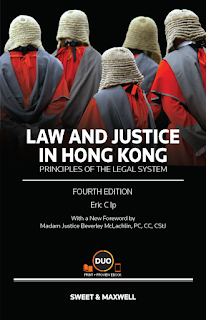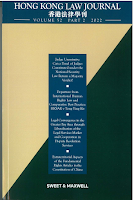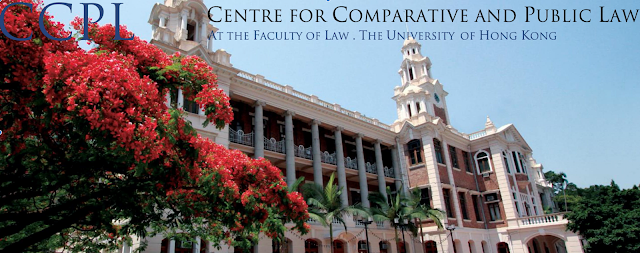Follow the research activities and scholarship of the Faculty of Law, The University of Hong Kong
Monday, October 31, 2022
Rehan Abeyratne & Po Jen Yap on Constitutional Dismemberments, Basic Structure Doctrine, and Pragmatic Justifications in Context (Int'l J Const L)
Saturday, October 29, 2022
HKU Law Call for Papers: The Empirical Turn in Chinese Legal Research: Challenges, Strategies, and Solutions (due: 30 Nov 2022)
- Data generation and collection
- Methodological choices and trade-offs
- The generalizability or representativeness of small or local samples
- The relationship between empirical and theoretical or doctrinal research
Welcome to HKU Law's Global Academic Fellow Dr Cynthia Farid
Sunday, October 23, 2022
New Edition by Eric Ip: Law and Justice in Hong Kong: Principles of the Legal System (4th Edition) (Sweet & Maxwell)
Law and Justice in Hong Kong: Principles of the Legal System (4thEdition)
Eric Ip
Sweet & Maxwell
Published in September 2022
507 pp.
'This book, Law and Justice in Hong Kong, has become an indispensable reference for anyone interested in or working with the Hong Kong legal system.'
Madam Justice Beverley McLachlin PC, CC, CStJ, Non–Permanent Judge of the Hong Kong Court of Final Appeal, Chief Justice of Canada (2000–2017)
Thoroughly rewritten and updated, the fourth edition of Law and Justice in Hong Kong continues to offer readers a comprehensive account of the legal system of the Hong Kong Special Administrative Region of the People’s Republic of China—the only common law jurisdiction in East Asia. Featuring discussions of the latest case law, the COVID-19 pandemic, and watershed legal events in recent years, it enables readers to appreciate the fundamental principles of law and the administration of justice that drove Hong Kong’s historic transition from a fishing settlement into a leading international financial centre over the course of nearly two centuries.
An essential text for students studying Legal System and Legal Research, this book is useful also to legal practitioners, jurists, and general readers, both in Hong Kong and abroad, who find interest in the spectacle of an internationalised common law system operating under the sovereignty of the world’s most powerful socialist state.
Thursday, October 13, 2022
New Issue of Hong Kong Law Journal (Vol. 52, Part 2 of 2022)
TABLE OF CONTENTS
Analysis
Combatting Intimate Image Abuse in Hong Kong
Thomas Crofts... 405
Lecture
Words to Law Students, Lawyers and the Public
Kemal Bokhary... 431
Articles
Danian A. Wan and Trevor T. W.
Wan... 439
Departure from International Human Rights Law and Comparative Best Practice: HKSAR v Tong Ying Kit
Yan-ho Lai and Thomas E. Kellogg... 465
Fa Chen ... 487
Competition Law: An Exception to Human Rights?
Stephen Crosswell... 513
Yun Zhao and Hui Chen... 555
Case Studies of Securities Fraud in the VietnameseSecurities Market
Toan Minh Le, Gordon Walker, Ha Hai Duong, and Trang Huu Tran... 583
China Law
“Visit Your Parents”: How Chinese Courts Apply the Elderly
Law Luxue Yu... 615
Judicial Regulation of Standard Form Contracts in China
Yuxuan Wang... 641
Extraterritorial Aspects of the Fundamental Rights Articlesin the Constitution of China
Liang Yu and Fons Coomans... 683
Dancing in Chains: Reassessing China’s Foreign InvestmentLegislation (Part I)
Li Yang, Hui Pang and Charlie Xiao-chuan Weng... 709
Force Majeure under Chinese Law as Applied to Port TerminalOperations
Haifan Yang and Ling Zhu... 731
Valuation Adjustment Mechanism in China: A Risk Management Strategy or Risk- Triggering Device? Xuedan (Shelly) Xiong... 757
Book Review
Sida Liu... 785
New Issue of Hong Kong Law Journal (Vol. 52, Part 1 of 2022)
TABLE OF CONTENTS
Lecture
Food, Clothing
and Housing as Human Rights
Kemal Bokhary… 1
Articles
Fan Xiang… 9
Paul Law and Trevor Wan… 43
The CISG and its Extension to a Territorial Unit of a Contracting State: The Case of HongKong
Liu Qiao… 67
Horus Qi, Pengfei Zhang and Tingting Ni… 89
Parent
Company’s Joint Liability in Tort: An Alternative to Manage Corporate Tort
Problems
Xue Feng… 117
Chen Zhijie… 157
No-Fault
Divorce: The Right Direction towards Therapeutic Justice
Leon Vincent Chan and Andrea Ang Si Min… 183
Regulating
Weighted Voting Rights in Asia: Pragmatism or a Race to the Bottom?
Charlie Weng Xiaochuan… 209
Diversity of
Mediation and its Impact on the Singapore Mediation Convention
Cai Wei… 237
China Law
The Doctrine of Kompetenz-Kompetenz: A Sino-French Comparative Perspective
Fu Panfeng… 259
Xue Renwei… 289
The Autonomy
of Charities in China
Hui Jing… 323
Meng Ye and Chen Li… 351
June Wang Zhiqiong… 367
Book Review
Towering Judges: A Comparative Study of Constitutional Judges
Evan Rosevear... 397
Patricia Ho… 403
Tuesday, October 11, 2022
New Book by Melissa Loja (PhD 2018): International Agreements between Non-State Actors as a Source of International Law (Hart)
Sunday, October 9, 2022
HKU CCPL Newsletter Fall 2022
|
|
|
|
|
|
|
|
|
|
|
|
|
|
|
|
|
|
|
|
|
|
|
|
|
|
|
|
|
|
|
|
|
|
|
|
|
|
|
|
|
|
|
|
|
|
|
|

































